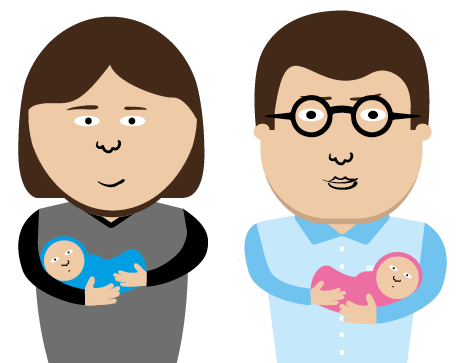In this section
Want to know more?
Website Feedback
We'd love to hear your thoughts on our website. This will help us continue to improve the experience you have while visiting our website and the content we have.
What sort of children need adoption?
At any one time over 50,000 children are being cared for by Local Authority departments around the country. The majority of these will return to birth families but many of the remaining children, approximately 4,000 every year, are waiting for adopters to be found for them.
Babies
Up until the 1960’s almost all children who were adopted were babies. This is no longer the case. Society has changed and most single women, who may have given up their babies for adoption (because of the way society viewed unmarried mothers at that time), now choose to keep them. It is now rare for babies to be freely given for adoption and most of the children needing adoptive families have been removed from their birth families and taken into the care of local authority departments. Most babies needing adoption will be at least 12 months old when placed and the majority of children will be considerably older than this. These children come from a range of ethnic and cultural backgrounds.
Groups of Brothers and Sisters
Over half of all the children referred for adoption nationally are in sibling groups of 2, 3, 4, or more, ranging in age from newborn to teenage and from many different ethnic backgrounds. In some cases one sibling may be disabled or have special needs. These children have already experienced much loss and trauma in their lives and have a strong emotional attachment to one another. They need to live and grow up together.
Disabled Children
There are a significant number of disabled children in need of adoptive families. These children are of all ages and ethnicities and are aged from birth upwards. They may be learning disabled, physically disabled, have specific health needs or diagnosed conditions such as Down’s Syndrome or Cerebral Palsy. Some may have life limiting conditions.
Children whose Future Development is Uncertain
Some children may be developmentally delayed and this can be for a number of reasons. When a child is young it is often difficult to tell if this is due to the care they have received prior to coming into care or for organic reasons. This becomes clearer over time and as the child grows and develops in a caring and stimulating household. Adopters have to consider that such children may or may not ‘catch up’ and be prepared to continue caring for a child regardless of the outcome.
Black, Asian and Mixed Heritage Children
There is a great shortage of adoptive families for children who are African, African Caribbean, Asian, mixed heritage or from other ethnic minorities. These children often wait much longer for adoptive placements. It is essential that a family that a child is placed with is in a strong position to meet the child’s emotional, identity, health and developmental needs. Over many years, research and practice experience indicates that children usually do best when brought up in a family that reflects or promotes their ethnic, cultural and religious identity. What this means in practice is that efforts are made to find a family that reflects or can promote the child’s individual identity. However, this search always needs to be balanced against the importance of minimizing any delay in placing the child. In practice, social workers need carefully to consider how available adopters can meet as many of a child’s assessed needs as possible whilst ensuring the child is placed with the minimum of delay.
Children of School Age
Many children in need of adoptive families are of school age and have emotional or behavioral difficulties due to their past experiences. Adoptive families are needed for these children from all ethnic and cultural backgrounds.
Children’s Backgrounds
Children’s backgrounds are varied and can be quite complex. Even very young children have often experienced unsettled lives and, sadly, some have experienced neglect or abuse. Adopters should be aware that parenting these children will require a commitment which is different to parenting a child born to them. Their behaviour will present different challenges and demands and they will need time and patience to help them to integrate into a new family. The task can be challenging but also rewarding.







